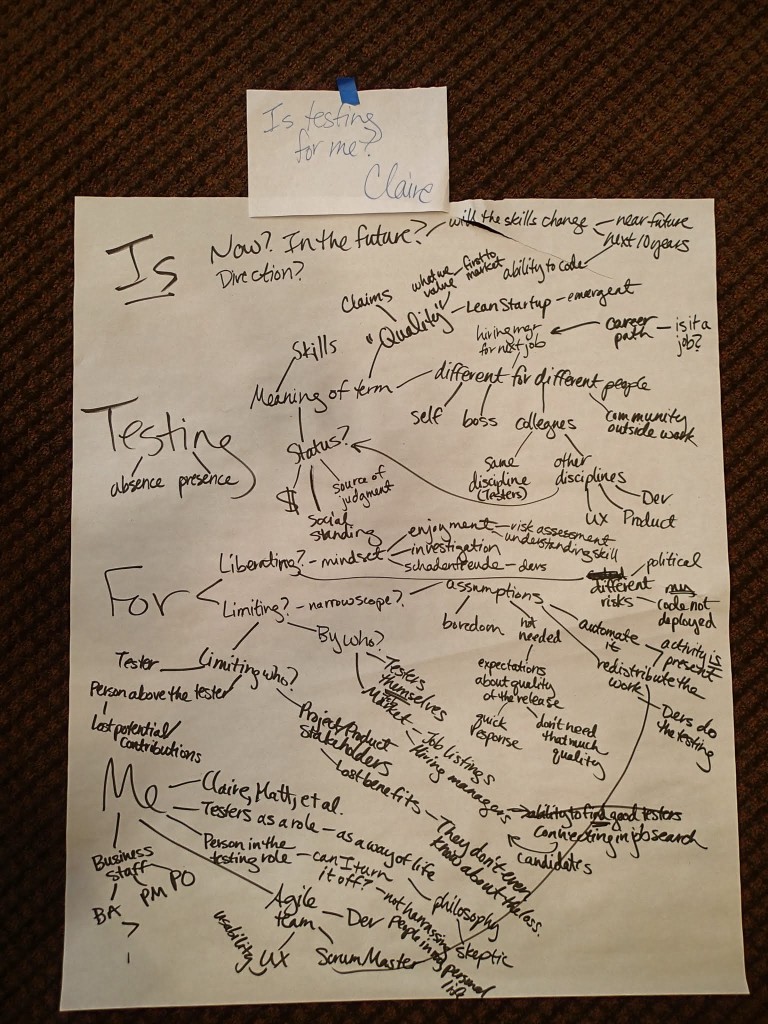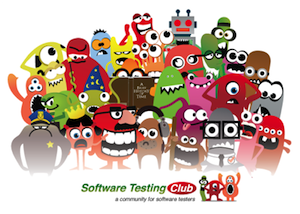Announcing Ministry of Test Atlanta
Last fall was the last of our Software Testing Atlanta Conference (STAC) events. An attendee at my Intentional Learning Workshop chatted with me afterward. I mentioned that I have been a local meetup organizer and have struggled with how much control to retain. My attendee urged me to give the meetup back to the community and I have been pondering that ever since.
I’ve been the primary organizer of the Software Testing Club Atlanta meetup since we began as an affiliate of the UK-based Software Testing Club in October 2013. My charter has always been to serve and develop the local testing community including connecting it with the global virtual community. Not everyone agreed about including digital attendees, but I am willing to experience the friction of a virtual meeting to help people to attend who otherwise would not have a chance. Inclusion matters to me.
I also prefer small groups and experiential events/activities that Justin talks about. I have never had a goal of increasing the size of our meetup beyond what a single facilitator could manage in a workshop.
STAC was just a bigger extension of the meetup for me. I always wanted to reach more people in the local community, so putting together a conference focused on my geographic region was a great chance to bring new local voices to the fore. I never wanted it to be a big formal event, so I’m working on an ATL software testing unconference for the fall: shortSTAC. More on that to come!
This has been an awesome ride over the last 3 years, but we’re re-branding and branching out into our very own Meetup now known as Ministry of Test Atlanta!
Please join us to keep up with our events!
As part of our reboot, I wanted to share some thoughts on what challenges a meetup organizer confronts every month and why monthly events are so difficult to sustain!
Meetups are tough for reasons
1. Location, location, location!
People interested in testing are spread out across ATL and traffic suuuuuucks. Plus, I have no budget, so someone has to be willing to host for free or sponsor the venue fee $$. I don’t want to hold the meetup only in one part of the city since that alienates interested test enthusiasts. Proximity to public transit is something I’m not sure matters, but it would make the meetup more accessible to more testers.
Over the past 3 years, we’ve had completely different crowds depending on which part of the city we chose. I preferred to rotate locations to give everyone some opportunity to attend, even though that introduced uncertainty that probably negatively affected attendance… It’s impossible to make the “right” choice for everyone who *might* attend…
Anyway, I work at VersionOne now and that means I can host, so that’s one variable taken care of!
2. Scheduling
We hold meetings on weeknights assuming that people are more likely to do work-related things on workdays – and would be more reluctant to give up their weekend fun time to work-ish things. Getting all of the stars aligned to schedule these meetups monthly *and* give enough time for people to RSVP and then work out the logistics of showing up… Timing is hard.
Since we tend to meet after work, providing food and drink encourages people to attend, but that’s not free… and I have no budget.
3. Funding
Food and drink cost $$ – someone has to be willing to sponsor the foodz, and drink
Possible sources of funding:
- donations from individual attendees
- local sponsors (probably companies)
- I’ll have to check on company budget to see whether I can do pizza & sodas every time but I know I can do it sometimes.
- the Association for Software Testing
- Software Testing Club/Ministry of Test
- or even the Agile Alliance.
4. Content
Not everyone wants to present or run a workshop or host a round table or … yeah. People will show up but may not want to provide content. I have to find a willing volunteer to do it for free or someone to sponsor a fee $$.
We infrequently have presentations. Most of our events are workshops or rountables or some sort of interactive experience. My go-to is Lean Coffee since it lowers the barrier to getting groups together and provides value to attendees every time.
I’m definitely interested in scheduling joint events with other Atlanta meetups in the future.
5. Publicity
How do people find out about meetings? I do the social media management, but I have no budget so … mostly word of mouth otherwise? Maybe chat rooms?
6. Audience
I assume that most of the people who want to come to a testing meetup are testers, but not all test enthusiasts are testers. We’ve had development-types show up, so I want to keep it open and inclusive.
7. Viewpoint advocated
I refuse to insist people agree with me. I won’t call it a context-driven testing meetup or an agile testing [PDF] meetup because I want to welcome people who subscribe to other philosophies of testing. That said, I also don’t want vendor talks (and yes I work for a vendor now). This group is for engaging with ideas focusing on and around testing, not for mind-clubbing or selling or exchanging business cards. Active participation is expected and encouraged.
8. Volunteers
Organizing: While I have always had a core group of enthusiastic participants, I’ve never had a formal organizing committee. Being a one-woman-show most of the time is pretty exhausting, y’all. The meetup consumed lots of my free time. I made my professional hobby the primary thing I did for fun outside of the office for years. Um… not a sustainable model. I do not recommend it. At the same time, working with others means compromise, so consider carefully the tradeoffs and find allies who believe in your mission.
Presenting: Members of my core group have all helped out with content for the meetup – for which I am eternally grateful! I’ve also encouraged other local aspiring presenters to practice on us. Occasionally, someone I know from the wider testing community is in town and joins us to share their wit and wisdom. I resisted presenting at my own event for a long long time… until I needed content LOL



